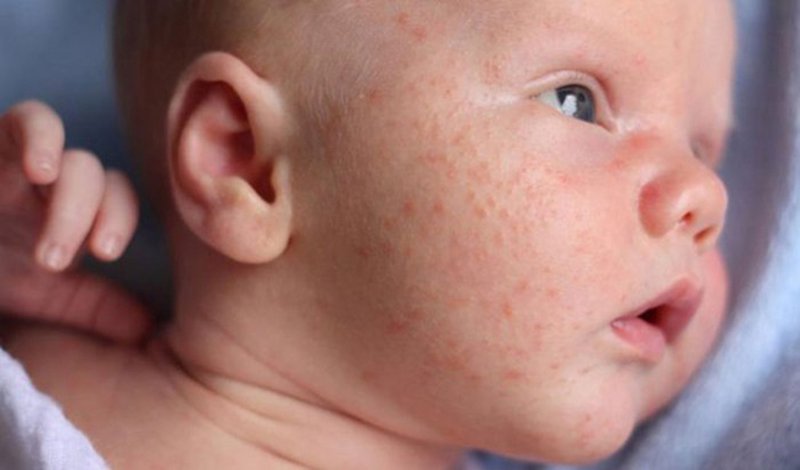1 Why Do Babies Develop Weather Allergies?
There are numerous reasons why infants may experience weather allergies. Aside from a weak immune system and underdeveloped immunity, other factors include:
- Sudden temperature changes cause a discrepancy between the internal and external body temperatures. The baby’s body then releases a large amount of histamine, leading to allergic reactions.
- Unstable weather conditions, ranging from humidity to dryness and fluctuating temperatures, create a favorable environment for pollen, mold, and dust to thrive and spread allergens. This is also a contributing factor to weather allergies.

2 Symptoms and Manifestations of Weather Allergies in Infants
Prolonged weather allergies in infants can be closely associated with certain medical conditions such as asthma, eczema, and allergic rhinitis. Pay close attention to the following common signs: skin rashes, flaky skin, runny nose, sneezing, nasal congestion, coughing, headaches, red eyes, tearing, and conjunctivitis.
If the infant exhibits labored breathing or shortness of breath when exposed to allergens, they may be experiencing allergic asthma triggered by changing weather conditions.

3 What to Do When Your Child Has Weather Allergies
Minimize Exposure to Allergens
- When it’s windy, keep the windows closed. If possible, use an air purifier or air conditioner to generate clean air and ensure a safe environment for your child.
- During weather changes, limit your child’s outdoor playtime to avoid exposure to pollen.
- Bathe, wash hands, and change into clean clothes after being outdoors.
- If your child has weather-induced allergic rhinitis, rinse their nose with saline solution or try steam inhalation with essential oils.

Medical Treatment as Advised by a Doctor
Take your child to a healthcare center, where doctors can examine them, identify the cause, and prescribe medication. The type and duration of treatment will depend on the severity of the condition.
It is imperative to follow the doctor’s instructions regarding medication and not to administer any drugs without their advice. If you notice any abnormal reactions to the prescribed medication, stop using it immediately and seek medical attention.

Avoid Trigger Foods
- High-protein foods: For infants with weather allergies, excessive protein on the surface of raw or undercooked meat, sushi, and raw fish can trigger allergic reactions in 25% of people with allergic rhinitis. It may cause symptoms such as itching of the lips, mouth, or throat.
- Fruits: Some fruits may have pollen residue on their surface, which can cause allergies. Therefore, wash fruits thoroughly before feeding them to your baby, and avoid giving them fruits picked from the street without proper washing.
- Vegetables: In reality, corn and celery are two types of vegetables that can trigger allergies, especially allergic rhinitis. Celery contains proteins similar to pollen and is a potent allergen. Thus, it is crucial to cook this vegetable thoroughly.

- Nuts: Nuts such as sunflower seeds, pistachios, and hazelnuts can also trigger allergic reactions in people with allergic rhinitis.
- Food additives: Certain additives in canned foods can induce allergic reactions in some individuals, especially those with allergic rhinitis. These additives may include artificial colors, preservatives, or flavorings.
- Cold food and drinks: Patients with weather-induced allergic rhinitis, asthma, or similar allergic symptoms should avoid cold food and beverages, as they can cause bronchial spasms and prolonged coughing. Cold treats like ice cream are particularly appealing to young children.
4 How to Prevent Weather Allergies in Children
- Ensure sufficient vitamin C intake from fruits and vegetables such as guava, oranges, tomatoes, and bell peppers.
- Probiotics found in yogurt can help boost immunity and alleviate allergic rhinitis symptoms, according to scientific research.
- Include antibacterial, anti-inflammatory, and antioxidant-rich spices like garlic, ginger, and turmeric in your child’s diet. Turmeric milk is a nutritious and unique drink for your little one.


































